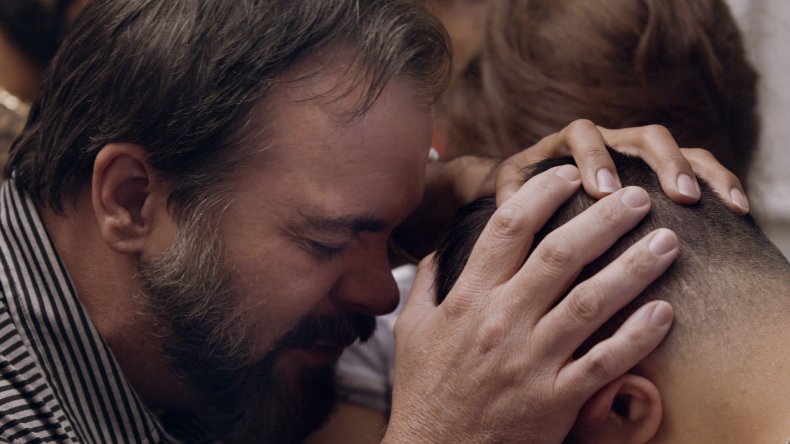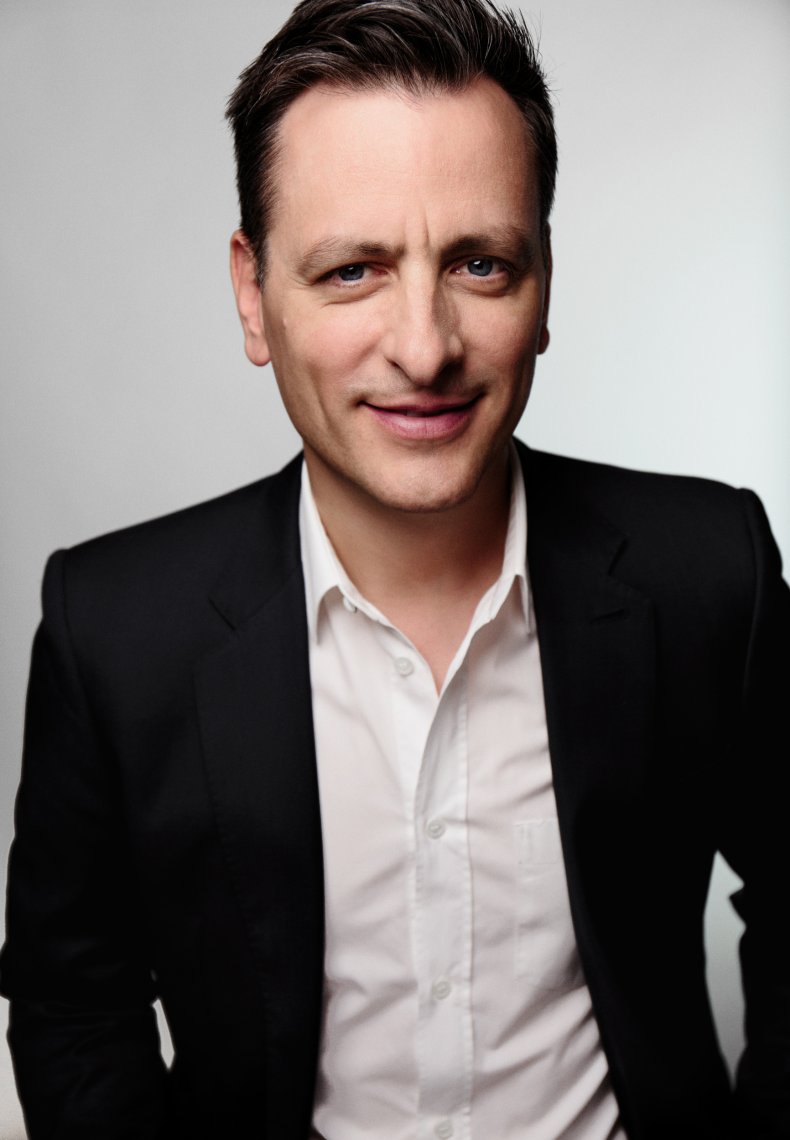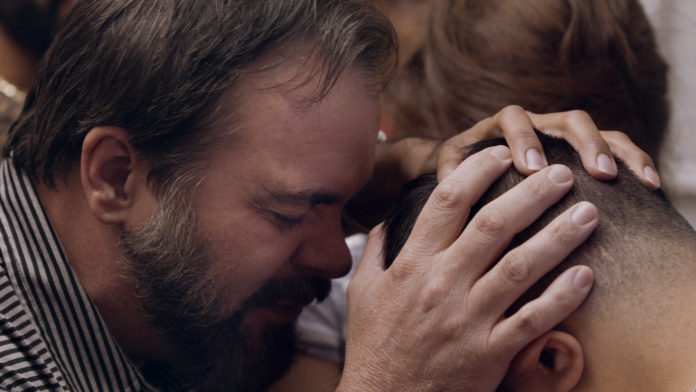The filmmaker behind Netflix‘s conversion therapy documentary Pray Away is defending the film against criticism from Christians that say the movie is one-dimensional and misinterprets Christianity.
Kristine Stolakis, the film’s director, told Newsweek that her main intent in making the documentary was to capture what she described as “the undeniable pain and drama of the conversion therapy movement.”
“I was not interested in putting the Bible on trial in this film,” Stolakis told Newsweek. “Underneath the consistent piece of this movement across organizations is this idea that the only way to change, to view your life as healthy, is to be cis and straight. That idea is damaging.”
Pray Away, released by Netflix on August 3, follows former leaders of Exodus International and the “pray the gay away” movement, also known as conversion therapy or reparative therapy. Conversion therapy is the practice of counseling and/or psychotherapy that attempts to change one’s sexual orientation or gender identity. Behind it is a belief that homosexuality is a mental illness that needs to be cured. Exodus International itself was an ex-gay Christian umbrella organization seeking to “help people wishing to limit their homosexual desires” that closed in 2013.
The film, executive produced by Ryan Murphy (American Horror Story, Glee) and Jason Blum, focuses on what the then-leaders of the organization now see as the damaging results of their actions to others. It also highlights the quest by one member for healing and acceptance from what she said is more than a decade of trauma.
The film was an official selection in both the Tribeca and Telluride Film Festivals, among others, hand as received notable attention in the press, with media outlets ranging from Time to the LA Times publishing write-ups on it.
Stolakis said she was inspired to make the film because of the real-life pain and trauma she watched her gay uncle experience while growing up in a religious culture that she said “taught him he was sick.”
“It is a type of wound that never necessarily fully heals for people,” said Stolakis. “It creates self-hatred in the deepest and darkest of ways while self-harm is such a part of this movement.”

Netflix
But some Christians, including one former Hollywood insider, said the film is missing a critical piece and described the film as “yet another thinly veiled attack on Christianity by Hollywood.”
Author Becket Cook, an ex-gay man who worked in Hollywood for decades and achieved notable success as a set designer in the fashion industry before committing his life to Christ, is the author of A Change of Affection: A Gay Man’s Incredible Story of Redemption. Cook once worked on major fashion campaigns for Vogue and Harper’s Bazaar.
“The secular world will eagerly lap up this one-dimensional film because misunderstanding and mischaracterizing the Christian life is a favorite pastime of Hollywood,” Cook, 53, said in a recent video on his YouTube channel entitled “What the ‘Pray Away’ Movie Gets Wrong.”
The episode, which he posted after writing an article/review of the film for The Gospel Coalition, has been viewed over 19,000 times and has received more than 600 comments, including one of support from fellow Christian and singer Chynna Phillips from the vocal group Wilson Phillips.
Cook told Newsweek it’s not that he doesn’t acknowledge the ill-fated mission of Exodus International.
“Exodus International was missing the forest through the trees, setting people up for failure,” he said.
“It’s no surprise these dubious methods failed. Attempts to ‘pray away the gay’ all too often fail, leaving struggling folks not only mad at God or personally scarred but, far worse, in a state of apostasy,” wrote Cook in his recent piece.
His larger point is that the film clenches on to what he describes as the faulty science of and unbiblical theology of conversion therapy to chastise anyone “who would dare leave, or desire to leave, the LGBTQ community.” That’s while he noted the contradictories that exist in the LGBTQ movement, which “on one hand insists that gay identity is unchangeable, while on the other hand insists sexuality and gender are fluid.”
“It’s not surprising that Netflix would seize on a false gospel to surreptitiously proffer a hit piece on Christianity in a lopsided tale of woe,” he wrote, noting what’s missing from the film is a proper understanding of theology and that misunderstanding is also what actually doomed Exodus International from the start.
“As author Christopher Yuan – who like me was redeemed out of a homosexual life – wisely puts it: the goal is not heterosexuality, it’s holy sexuality,” wrote Cook. “The message (in the film) is clear: if you are denying your sexual desires in order to follow Christ, you are just fooling yourself. Those desires are what define your identity, and to tamper with who you really are is dangerous and delusional.”
In all this, Cook said the message of Jesus and redemption gets lost.

Becket Cook
Cook’s own conversion story is one of contrasts. In 2009, he and a friend met a group of young people in a Los Angeles coffee shop talking with their Bibles open. After approaching them and questioning them about their beliefs, Cook took them up on their invitation to attend their church.
That event followed a moment six months earlier while he was looking across the room during a party in Paris and he said an overwhelming feeling of emptiness came over him that left him questioning the greater meaning of life.
“I had done everything in Hollywood, met everyone and traveled everywhere, yet was overwhelmed with emptiness,” he told Newsweek. “It was one of the most intense ‘Is that all there is?’ moments in my life.” Prior to that, Cook said he had dismissed believing in God as an option because he was gay and he wasn’t confused about what the Bible had to say about homosexuality.
For her part, Stolakis said she knows firsthand that religion as she put it “can be such a source of strength and beauty and connection in people’s lives” and that if someone feels more whole or healthier because of their religious practice, her intent is not to challenge that.
“The problem is when someone uses their personal story as proof that the only way to be psychologically and spiritually healthy is to be cis and straight. I cannot believe in a higher power that would support that idea … we know that gender fluidity and sex identity fluidity are real for people,” said Stolakis.
The filmmaker also wants those in the LGBTQ community to know there are a number of religious communities that will process the trauma they’ve experienced with them and stand for rights and dignity for LGBTQ folks.
“There is a stereotype that conversion therapy is a thing of the past and that is really not the case,” added Stolakis, noting that the majority of conversion therapy happens within religious organizations. She emphasized the importance of banning the practice.
“It’s really a present issue and that is something we want audiences to be very clear about because we really want to start a national and international dialogue in the culture about the need to end this,” she said. “I hope by documenting that in this film we then have the tools to dismantle the movement.”
Meanwhile, Cook was dropped from his talent agency three months after his book was published. He went on to earn a Master’s degree from Talbot School of Theology. Still, he re-iterated that misunderstanding and mischaracterizing the Christian life is a favorite pastime of Hollywood, of which he said he has experienced first-hand.
“I understand why I got canceled by Hollywood—it’s hard to have a book out in the world like I had and work on the set with Jessica Chastain,” he quipped.
“I was an atheist and gay, 12 years ago walked into an evangelical church, heard the gospel and had an experience that completely transformed my entire life,” Cook told Newsweek, noting he still struggles with same-sex attraction and is not heterosexual but that for him doesn’t matter because of his relationship with Christ.
“Now I feel like I’m doing what God had called me to do—he called me out of a life of homosexuality and sent me out to help churches understand this issue, theologically, biblically, culturally and personally from someone who has been on both sides of it,” he said.
His story exists amidst a myriad of those that seem to champion LGBTQ rights. A case in point is a People exclusive this week telling the heartwarming story about divorced couple Jessica and Matthew Turner, who split up after 16 years of marriage and having three children. Matthew Turner, a best-selling author and someone who spent 30+ years in fundamentalist/evangelical churches, spoke about the fear he long felt before coming out as gay. The article explores the couple’s journey through love, grief and coming out the other side of what was once a married relationship.
But Cook, who said he has nothing but love for the gay community, said in Tinseltown tolerance for different beliefs is unevenly tilted.
“The whole idea of tolerance has shifted so dramatically it’s bizarre,” said Cook. “When Ellen Page became Elliott Page, Hillary Clinton applauded but when I decided to become a Christian and be celibate, where’s the tolerance for me?”
“The culture says that you can change your identity at any time, including our gender, and pronouns, but your sexual orientation is absolutely fixed and if you try to change that you’re insane,” said Cook, “that if a Christian wants to a change that’s anathema.”








